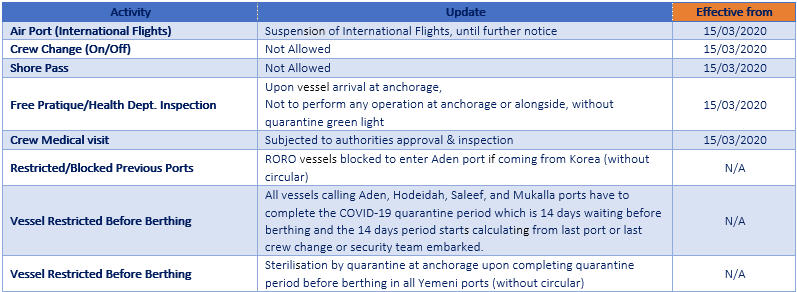On 9 April 2020, Saudi Arabia declared a two-week ceasefire in Yemen, which was proposed by the United Nations in an effort to slow the advance of COVID-19 in light that Yemen does not have the resources to withstand a highly contagious virus. On 17 April 2020, the first COVID-19 case was detected in Yemen. As a result, the Yemeni authorities has implemented a strict quarantine and control regime. This is in addition to the coalition-led port entry conditions which remain in effect.
At the time of writing, our correspondent, Wilhelmsen Ship Service, Yemen (WSS) reported the status of the Yemeni ports as follows:

Port entry conditions implemented due to COVID-19
WSS also informed that all vessels calling Aden, Hodeidah, Saleef and Mukalla ports must complete a 14-day quarantine before berthing. The 14-day period starts to count from departure of the last port or last crew change, or security team embarked. Other precautionary measures such as disinfecting communal onboard areas before berthing, temperature screening of crew members, prohibition of shore leave and crew changes, etc., could also be implemented.

Port entry conditions – coalition-led
- Vessels calling at Aden port – Clearance must be obtained from the Yemeni Ministry of Transport (MOT) no less than one week before the vessel's entry/arrival. The application should be submitted to the MOT via the cargo receiver before the arrival of the vessel, as well as the Operations Unit of the Supreme Relief Committee at: yemen.transport@gmail.com. The application form is the: Entry permission for commercial and relief ships to Yemeni ports.
- Vessels calling at Hodeidah or Saleef port : Clearance must be obtained from the UN Verification and Inspection Mechanism (UNVIM). Fully completed clearance requests must be submitted no later than five days prior to the vessel's arrival at the outer limits of these ports and preferably before the departure of the vessel from its port of loading. Any clearance request received after this period will incur delays. Details on the UNVIM standard operating procedures, list of required documents and the clearance request form, may be obtained from the UNVIM website: https://www.vimye.org.
Precautions & recommendations
- Ship operators/owners and Masters are recommended to obtain reliable up-to-date guidance from the local port authorities and ship's agent well in advance and to continuously monitor the developments as the COVID-19 situation may evolve quickly.
- Precautions must be taken to ensure proper compliance with the authorities' port entry conditions and control measures, in order to ensure the safety of the vessel and its crew.
- Vessels may experience delays and postponements due to the implemented entry conditions. Clarification of the port's status and security should be obtained from local sources.
- Members may utilise the online COVID-19 tracker developed by the International Group of P&I Clubs which enables tracking by country and port around the world.
- The working capacity of the Yemeni ports may be limited due to the likely lack of supplies and other services – eg. fuel supply, crane and equipment, manpower etc. Members are therefore advised to enquire about the status of these services in advance of vessel's arrival.
- Additional maritime security risks such as collateral damage due to the ongoing conflict in Yemen also remains present in the Southern Red Sea and Bab al-Mandeb. Members should comply with the guidance as provided by the Interim Guidance on Maritime Security in the Southern Red Sea and Bab al-Mandeb and the BMP5 when operating in the Red Sea and Gulf of Aden region. Vessels should also register with the Maritime Security Center Horn of Africa (MSCHOA) and report to the United Kingdom Maritime Trade Operations (UKMTO), and use the Maritime Security Transit Corridor (MSTC), where possible.
- Members should take note of the latest Port Security Advisory (2-19) of 16 May 2019 - the US Coast Guard (USCG) has determined that, with exception of Balhaf LNG Terminal, ports in Yemen are not maintaining effective anti-terrorism measures. The U.S. Coast Guard has separate, more stringent security protocols in place for vessels arriving to the United States from Balhaf. Vessels planning to arrive to the United States from Balhaf should contact the cognizant U.S. Coast Guard Captain of the Port well in advance. The USCG is required to assess the effectiveness of antiterrorism measures implemented in foreign ports from which US documented vessels and foreign vessels depart on a voyage to the US and other foreign ports believed to pose a security risk to international maritime commerce.
- All vessels arriving to the United States that visited the countries listed in in the Port Security Advisory during their last five port calls must take the following actions listed below while in the listed countries (including Yemen):
- Implement measures per the ship's security plan equivalent to Security Level 2;
- Ensure that each access point to the ship is guarded and that the guards have total visibility of the exterior (both landside and waterside) of the vessel. Guards may be:
provided by the ship's crew, however, additional crewmembers should be placed on the ship if necessary, to ensure that limits on maximum hours of work are not exceeded and/or minimum hours of rest are met, or
provided by outside security forces approved by the ship's master and Company Security Officer. - Attempt to execute a Declaration of Security;
- Log all security actions in the ship's security records; and
- Report actions taken to the cognizant U.S. Coast Guard Captain of the Port prior to arrival in the U.S.
- Any affected vessel that does not meet the stipulated conditions may be denied entry into the US.
